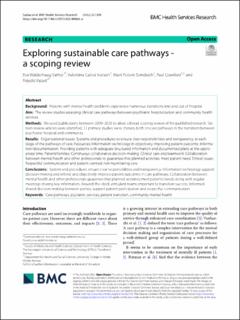| dc.contributor.author | Sæther, Eva Walderhaug | |
| dc.contributor.author | Iversen, Valentina Cabral | |
| dc.contributor.author | Svindseth, Marit Følsvik | |
| dc.contributor.author | Crawford, Paul | |
| dc.contributor.author | Vasset, Frøydis Perny | |
| dc.date.accessioned | 2023-02-10T09:41:27Z | |
| dc.date.available | 2023-02-10T09:41:27Z | |
| dc.date.created | 2023-01-02T11:16:05Z | |
| dc.date.issued | 2022 | |
| dc.identifier.citation | BMC Health Services Research. 2022, 22 1-23. | en_US |
| dc.identifier.issn | 1472-6963 | |
| dc.identifier.uri | https://hdl.handle.net/11250/3049946 | |
| dc.description.abstract | Background: Patients with mental health problems experience numerous transitions into and out of hospital. Aim: The review studies assessing clinical care pathways between psychiatric hospitalization and community health services. Methods: We used publications between 2009–2020 to allow a broad scoping review of the published research. Sixteen review-articles were identified, 12 primary studies were chosen, both on care pathways in the transition between psychiatric hospital and community. Results: Organizational issues: Systems and procedures to ensure clear responsibilities and transparency at each stage of the pathways of care. Resources: Information-technology in objectively improving patient outcome. Information/documentation: Providing patients with adequate structured information and documented plans at the appropriate time. Patient/families: Continuous collaborative decision-making. Clinical care and teamwork: Collaboration between mental health and other professionals to guarantee that planned activities meet patient need. Ethical issues: Respectful communication and patient-centred, non-humiliating care. Conclusions: System and procedures ensure clear responsibilities and transparency. Information technology support decision-making and referral and objectively improve patient outcomes in care pathways. Collaboration between mental health and other professionals guarantee that planned activities meet patients’ needs along with regular meetings sharing key information. Around-the-clock ambulant-teams important to transition success. Informed-shared decision-making between parties, support patient participation and respectful communication. | en_US |
| dc.description.abstract | Exploring sustainable care pathways : a scoping review | en_US |
| dc.language.iso | eng | en_US |
| dc.publisher | BioMed Central | en_US |
| dc.relation.uri | https://doi.org/10.1186/s12913-022-08863-w | |
| dc.rights | Navngivelse 4.0 Internasjonal | * |
| dc.rights.uri | http://creativecommons.org/licenses/by/4.0/deed.no | * |
| dc.title | Exploring sustainable care pathways : a scoping review | en_US |
| dc.title.alternative | Exploring sustainable care pathways : a scoping review | en_US |
| dc.type | Peer reviewed | en_US |
| dc.type | Journal article | en_US |
| dc.description.version | publishedVersion | en_US |
| dc.source.pagenumber | 1-23 | en_US |
| dc.source.volume | 22 | en_US |
| dc.source.journal | BMC Health Services Research | en_US |
| dc.identifier.doi | 10.1186/s12913-022-08863-w | |
| dc.identifier.cristin | 2098674 | |
| cristin.ispublished | true | |
| cristin.fulltext | original | |
| cristin.qualitycode | 2 | |

